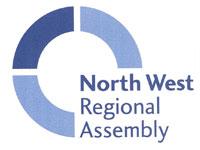
Metropolitan counties are a subdivision of England which were originally used for local government. There are six metropolitan counties: Greater Manchester, Merseyside, South Yorkshire, Tyne and Wear, West Midlands and West Yorkshire.

There has not been a government of England since 1707 when the Kingdom of England ceased to exist as a sovereign state, as it merged with the Kingdom of Scotland to form the Kingdom of Great Britain. The Kingdom of Great Britain continued from 1707 until 1801 when it merged with the Kingdom of Ireland to form the United Kingdom of Great Britain and Ireland, which itself became the United Kingdom of Great Britain and Northern Ireland (UK) in 1922 upon independence for most of the island of Ireland.
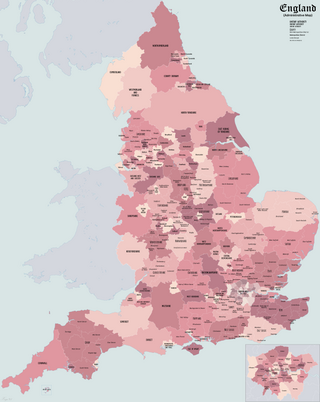
The subdivisions of England constitute a hierarchy of administrative divisions and non-administrative ceremonial areas.

Politics of England forms the major part of the wider politics of the United Kingdom, with England being more populous than all the other countries of the United Kingdom put together. As England is also by far the largest in terms of area and GDP, its relationship to the UK is somewhat different from that of Scotland, Wales or Northern Ireland. The English capital London is also the capital of the UK, and English is the dominant language of the UK. Dicey and Morris (p26) list the separate states in the British Islands. "England, Scotland, Northern Ireland, the Isle of Man, Jersey, Guernsey, Alderney, and Sark.... is a separate country in the sense of the conflict of laws, though not one of them is a State known to public international law." But this may be varied by statute.

The regional chambers of England were a group of indirectly elected regional bodies that were created by the provisions of the Regional Development Agencies Act 1998. There were eight regional chambers, one for each of the regions of England except Greater London, which had opted for an elected mayor and assembly in 1998. All eight regional chambers had adopted the title "regional assembly" or "assembly" as part of their name, though this was not an official status in law. The chambers were abolished over a two-year period between 31 March 2008 and 31 March 2010 and some of their functions were assumed by newly established local authority leaders' boards.

The North East England devolution referendum was an all postal ballot referendum that took place on 4 November 2004 throughout North East England on whether or not to establish an elected assembly for the region. Devolution referendums in the regions of Northern England were initially proposed under provisions of the Regional Assemblies (Preparations) Act 2003. Initially, three referendums were planned, but only one took place. The votes concerned the question of devolving limited political powers from the UK Parliament to elected regional assemblies in North East England, North West England and Yorkshire and the Humber respectively. Each were initially planned to be held on 4 November 2004, but on 22 July 2004 the planned referendums in North West England and in Yorkshire and the Humber were postponed, due to concerns raised about the use of postal ballots, but the referendum in North East England was allowed to continue, particularly as it was assumed that the region held the most support for the proposed devolution.
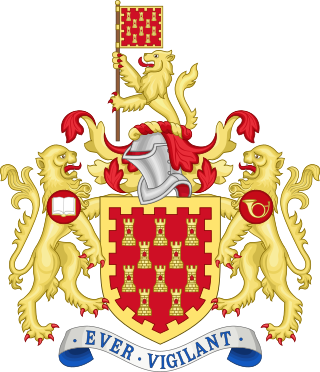
The Greater Manchester County Council (GMCC) was the top-tier local government administrative body for Greater Manchester from 1974 to 1986. A strategic authority, with responsibilities for roads, public transport, planning, emergency services and waste disposal, it was composed of 106 directly elected members drawn from the ten metropolitan boroughs of Greater Manchester. The Greater Manchester County Council shared power with ten lower-tier district councils, each of which directed local matters. It was also known as the Greater Manchester Council (GMC) and the Greater Manchester Metropolitan County Council (GMMCC).
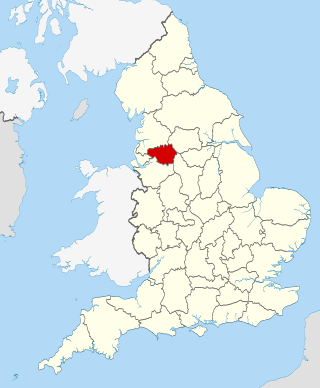
The Association of Greater Manchester Authorities was the local government association for Greater Manchester, a metropolitan county in North West England. Its creation followed the abolition of the Greater Manchester County Council, being established in 1986 as a governmental organisation to represent the ten district councils of Greater Manchester. AGMA was later superseded by the Greater Manchester Combined Authority, the first authority of this new type in the United Kingdom, on 1 April 2011.

The East of England Regional Assembly was the regional chamber for the East of England region of the England. It was based at Flempton, near Bury St Edmunds in Suffolk. The assembly was created as a voluntary regional chamber in 1998 by the Regional Development Agencies Act 1998. The first meeting was held in March 1999. In July 2003 the assembly was reconstituted to combine its existing functions with those of the regional arm of the Local Government Association and of the Regional Employers Organisation. The assembly was abolished on 31 March 2010, its functions transferring to the newly constituted East of England Local Government Association.

The South West Regional Assembly (SWRA) was the regional chamber for South West England, established in 1999. It was wound up in December 2008. Its functions were taken on by the Strategic Leaders' Board, the executive arm of the newly established South West Councils.
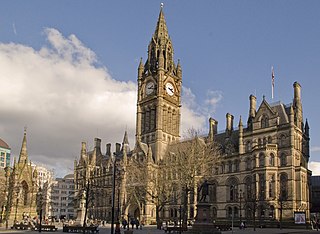
The City of Manchester forms part of the metropolitan county of Greater Manchester, which had its county council abolished in 1986. Manchester consists of several districts, but these districts do not represent a tier of government.
In England, spatial planning is undertaken at the national level, through the National Planning Policy Framework. The London region is the only one to have a statutory London Plan. Most planning functions are exercised by local authorities, with neighbourhood planning also taking place in some areas.
North West Employers, previously known as the North West Regional Leaders Board, is the Local Authority Leaders’ Board for the North West region of England. It was established on 15 July 2008 and replaced the North West Regional Assembly. It was initially based at Wigan, in Greater Manchester but has since moved to St Helens in Merseyside.

Local authority leaders' boards are voluntary regional associations of council leaders that have been established in England outside of Greater London to replace certain functions of the now abolished regional chambers. The establishment of the boards was part of the UK Government's Review of Sub-National Economic Development and Regeneration. which brought forward the Government's plans to alter the structure of regional governance in England and was mandated by the Local Democracy, Economic Development and Construction Act 2009. In June 2010, the new Conservative-LibDem coalition government announced plans to remove funding from the new boards and to remove their statutory functions. It was indicated that the boards might continue as voluntary associations of council leaders.

The regions of England, formerly known as the government office regions, are the highest tier of sub-national division in England. They were established in 1994 and follow the 1974–96 county borders. They are a continuation of the former 1940s standard regions which followed the 1889–1974 administrative county borders. Between 1994 and 2011, all nine regions had partly devolved functions; they no longer fulfil this role, continuing to be used for limited statistical purposes.

The Leeds City Region, or informally Greater Leeds, is a local enterprise partnership city region located in West Yorkshire, England. Prior to the West Yorkshire devolution deal, the partnership covered parts of South and North Yorkshire. According to the Office for National Statistics, as of 2017 the city region ranked 2nd behind Greater London for both population and GVA in the United Kingdom. It has a population of 2,320,214 million and a GVA of £69.62 billion.

A combined authority (CA) is a type of local government institution introduced in England outside Greater London by the Local Democracy, Economic Development and Construction Act 2009. CAs are created voluntarily and allow a group of local authorities to pool appropriate responsibility and receive certain devolved functions from central government in order to deliver transport and economic policy more effectively over a wider area. In areas where local government is two-tier, both must participate in the combined authority.

The Greater Manchester Combined Authority (GMCA) is a combined authority for Greater Manchester, England. It was established on 1 April 2011 and consists of 11 members: 10 indirectly elected members, each a directly elected councillor from one of the ten metropolitan boroughs that comprise Greater Manchester, together with the directly elected Mayor of Greater Manchester. The authority derives most of its powers from the Local Government Act 2000 and Local Democracy, Economic Development and Construction Act 2009, and replaced a range of single-purpose joint boards and quangos to provide a formal administrative authority for Greater Manchester for the first time since the abolition of Greater Manchester County Council in 1986.

In the United Kingdom, devolution is the Parliament of the United Kingdom's statutory granting of a greater level of self-government to the Scottish Parliament, the Senedd, the Northern Ireland Assembly and the London Assembly and to their associated executive bodies: the Scottish Government, the Welsh Government, the Northern Ireland Executive and in England, the Greater London Authority and combined authorities.

The Mayor of the Liverpool City Region, is the directly elected mayor of the Liverpool City Region, who is responsible for regional governance over a number of issues, the Mayor has powers devolved to them from the Central Government, as well as this the mayor chairs the Liverpool City Region Combined Authority.
